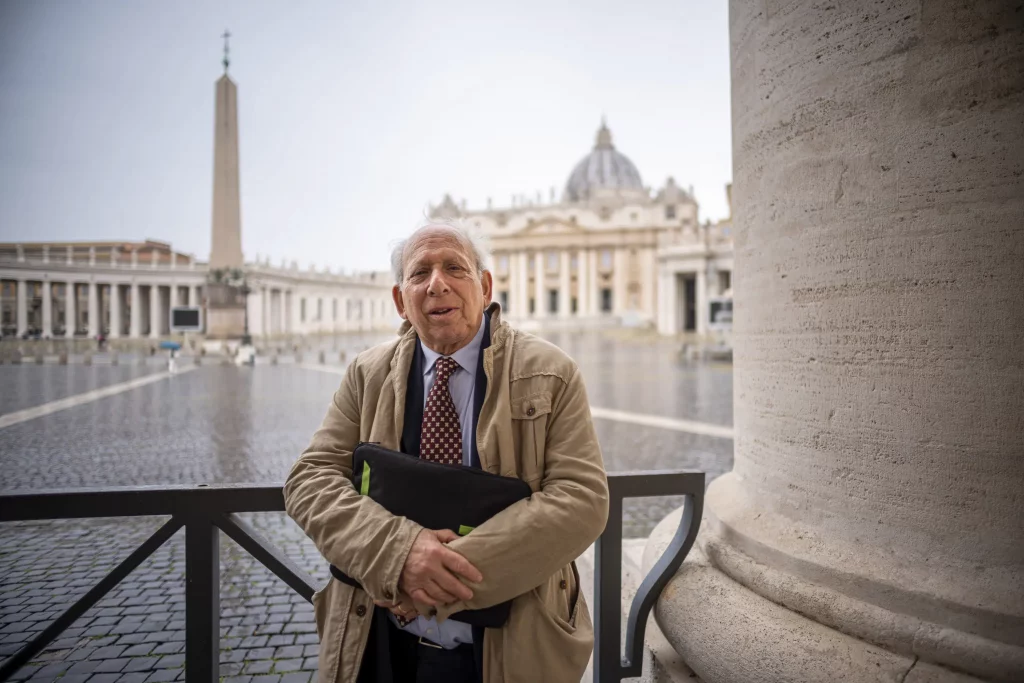ROME (AP) — Returning to Rome from Beirut in September 2012, I was escorted down the aisle to the first class section of the papal plane and seated beside Pope Benedict XVI.
The pope, then 85, looked tired. He had just completed a delicate two-day visit to Lebanon as civil war raged in neighboring Syria.
It was my 92nd such trip: the first was with Pope John Paul II, the papal globetrotting master, and then for the past eight years with Benedict.
Because I intended to retire, Benedict’s trip to Beirut was to be my last, and Vatican officials thought I should share this moment with him.
What I didn’t know at the time was that this would also be his last trip. Within months, he would become the first pope to step down in 600 years.
On this flight, Benoît was clearly tired, but he remained as friendly as usual.
“Congratulations on your retirement,” he said softly, speaking in his German-accented Italian that often made Italians laugh.
When I told him that I had covered the Vatican for over 30 years, he looked surprised. He looked melancholy as he said my retirement “is well deserved”.
I always wondered if our meeting had caused him to think about his own plans that he hadn’t yet revealed to the world. The retirement date he later announced was February 28 – the exact date I had chosen to retire.
On the plane, Benedict seemed pleased with our conversation and in no rush to end it – it was his assistants who waved me back to my seat.
“Gracious” is a word I always associate with Benoît, who was always ready to shake hands and say something appropriate for the occasion.
In the Netflix drama “The Two Popes,” Benedict, played by Anthony Hopkins, is portrayed as uncompromising in his belief that the survival of the Roman Catholic Church can only be ensured by a return to its fundamental principles.
Yet, in his own way, Benoît was a revolutionary.
He was the type to hold his ground and not back down, no matter what outside pressures he was under. But he also seemed almost oblivious to the storms he would create.
When the inevitable questions arose about his past in Nazi Germany, he was able to point out that he covered that territory in several interviews conducted years before becoming pope: his compulsory membership in the Hitler Youth as a teenager; to be drafted into the army towards the end of the war; his desertion and surrender to the Americans.
He thus avoided the controversies faced by others less honest about their history. It certainly paved the way for his papal visits to the Nazi death camp of Auschwitz, Israel and to the synagogues of Rome and New York.
It was fascinating to hear him chatting in German with Rabbi Arthur Schneirer, the Vienna-born rabbi, during a stop at the Park East Synagogue in New York. They looked like two old friends.
In one of the major crises of his papacy, a speech aimed at promoting tolerance between religions ended up provoking anger – and even some violence – in the Islamic community.
In a 2006 speech at the University of Regensburg in Germany, where he was a professor of theology, Benedict XVI quoted a 14th-century Byzantine emperor who called Islam “evil and inhuman, like his command (from Prophet Muhammad) to spread by the sword”. the faith he preached.
The remarks were quickly condemned in the Muslim world, but Benedict seemed surprised that what he considered scholarly speech could create such resentment.
He said he was “deeply sorry” that some took offense, but must insist that religion can never be a motivation for violence.
Years later, his former spokesman, the Reverend Federico Lombardi, said Benedict knew exactly what he meant by his remark.
When Benoît made his first trip to Africa, a French journalist asked during a press conference on board the flight to Cameroon in 2009 if condoms could play a role in the fight against HIV.
“On the contrary, it (condom use) increases the problem,” he said.
Journalists and others on the plane were left baffled by the response, which contradicts the views of health workers and many of his own priests battling the disease on the mainland.
He backtracked just over a year later, saying condom use could be a first step towards more moral behavior to prevent the spread of HIV.
It was the kind of clarification that was a sign of the ongoing confusion and Vatican infighting that marked Benedict’s papacy.
In the years following his resignation, Benedict became increasingly frail and remained out of public view in a monastery within the walls of Vatican City. He devotes himself mainly to prayer.
But his contributions to the Church, which included paving the way for Pope Francis, were not forgotten by his Argentine successor. In 2021, when Benedict was 94, Francis sent a public thank you to the German on the 70th anniversary of his priestly ordination.
“To you Benoît, dear father and brother, go our affection, our gratitude and our closeness,” François said.
___
Victor L. Simpson covered the Vatican for The Associated Press from his arrival as Rome correspondent in 1972 until his retirement as Italy bureau chief in 2013. During that time he covered the latest month of Pope Paul VI, the 33-day tenure of Pope John Paul I and the papacies of St. John Paul II and Benedict XVI, including 92 of their trips abroad.
___
Follow AP’s coverage of the death of Pope Emeritus Benedict XVI on https://apnews.com/hub/pope-benedict-xvi
